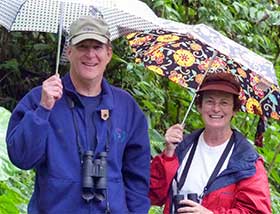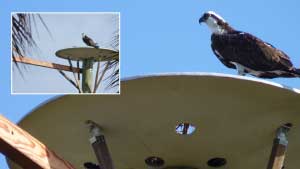[printfriendly]Her Best-Laid Plans Turn Out Even Better

Like many kids who grew up in Florida, Suzanne Cooper always wanted to be a marine biologist. Luckily for Tampa Bay, she ended up earning a master’s degree in botany and then became a planner who has directed the Tampa Bay Regional Planning Council’s Agency on Bay Management for the last 20 years.
Under her leadership, Tampa Bay has been recognized as one of the only urban estuaries in the world where water quality is improving even as human populations continue to grow. “Suzanne’s steadfast commitment to the environment has made her a true champion of Tampa Bay,” said Holly Greening, executive director of the Tampa Bay Estuary Program.
Even as controversial issues were addressed, Cooper has been even-handed and focused on the big picture, adds Tom Ash, chairman of the ABM’s natural resources/environmental impact review committee. “She has an uncanny ability to see the interconnected issues, to connect all the dots and to keep everyone on task.”
She’s made ABM one of the most respected environmental organizations in the state, said Bob Minning, mayor of Treasure Island who serves as chairman of both ABM and TBRPC. And she’s always gone above and beyond, notes Manny Pumariega, TBRPC’s executive director. “We’d been talking about the ‘Tarpon Tag’ for years but it kept getting put on a back burner until Suzanne came to me with a list of reasons on why it should be restarted. She was the one who talked to legislators, gathered signatures and made it happen.”
The Tarpon Tag automobile license plate raises over $90,000 each year for improvements and education in Tampa Bay and its watershed, and since enactment has raised more than $1.7 million for TBEP mini-grants as well as funding for Bay Soundings. “Her name isn’t on many stories, but her eagle eyes have reviewed every word we’ve ever published,” said Victoria Parsons, Bay Soundings editor.
USF first attraction to Tampa Bay
A native of Jacksonville, Cooper first came to Tampa Bay in 1969 to attend the University of South Florida, expecting to enter its fledgling marine science program in St. Petersburg. No dormitories and its focus on upper-level classes sent her to the Tampa campus where she met the professors who helped change her goals.
“I was always more interested in ecology so it made sense to take more botany classes – particularly when faced with a class in comparative anatomy,” she quips. “Plus it’s easier to identify plants than animals because they don’t move as fast.”
Working with USF botany professors gave her the opportunity to get outside and collect plants in distinct habitats like Mound Key in Estero Bay, where she helped develop a checklist for the state park, and the property now known as Rock Ponds on Tampa Bay’s eastern shore.
“TECO had purchased it and was planning to use the salt barrens as cooling ponds for a new power plant,” she said. “They needed a biological survey, so we got out there with specialists in birds, mammals, herps (amphibians and reptiles) and me doing the botany.”
Of course, salt barrens aren’t really barren and the team recommended that TECO find another place to build a power plant.
Steve, her newly wed husband, questioned her ability to make any money with a master’s degree in botany, but she quickly landed a job as an assistant botanist studying the potential impact of completing the Cross Florida Barge Canal, started in 1935 but halted in the early 1970s.
“I got the chance to cover lots of amazing habitat collecting plants, I loved it,” she says.

After two terrific work experiences over eight years in Tallahassee, she and Steve moved back to Tampa. “Everybody I talked to said I should go to work for the regional planning council. It just so happened that they had a job opening for a planner.”
Working as a planner, Cooper coordinated the review of almost a hundred DRIs (developments of regional impact), giving her a big-picture overview of how growth impacts everything from roads and schools to bays and birds. She turned down the chance to lead ABM when the job was first offered to her, but took it the second time in 1993.
“There really isn’t another organization like ABM because we bring so many stakeholders together – from ports and ship pilots to phosphate, electrical utilities and petroleum interests plus anglers, environmental advocates, governments and regulators at the local, state and national level.”
So what’s on her agenda after such a full career, not to mention staffing ABM meetings nearly every second Thursday for the last 20 years? “A lot of little things,” she says. At the top of the list is her first grandson, born Dec. 23, and continuing her involvement with Christ the King Catholic Church. Readers of Bay Soundings will also be delighted to know that she’ll continue to share her expertise on all things Tampa Bay as a volunteer editor.
[su_divider]